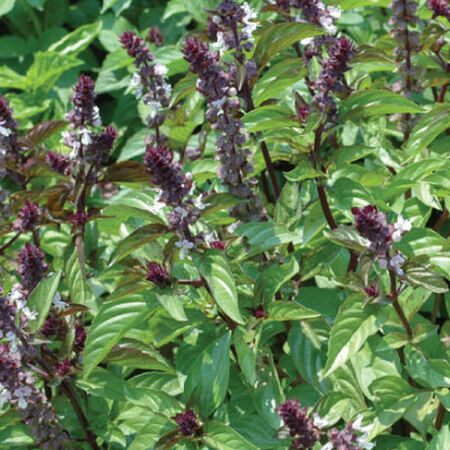Cinnamon, Basil Seeds
Key Attributes
Cinnamon basil seeds produce a fragrant herb known for its unique, spicy flavor reminiscent of cinnamon, which is a result of its distinct oil composition. Originating from the Mediterranean region, cinnamon basil (Ocimum basilicum 'Cinnamon') has been cultivated for centuries, often used in culinary dishes and traditional remedies. The plants typically grow to about 12-24 inches tall, featuring dark green leaves with reddish-purple stems, adding visual appeal to gardens.
The leaves are slightly crinkled and can be harvested throughout the growing season, with peak flavor occurring just before the plant flowers. Cinnamon basil thrives in warm, sunny conditions and well-drained soil, making it an excellent choice for home gardens and containers. Its growth habit is bushy and upright, attracting pollinators while deterring pests. With a growing season of about 60-90 days, cinnamon basil is not only a flavorful addition to dishes like Thai curry and salads but also an attractive herb that enhances any garden space.
Key Attributes
Product Details
Weight
0.008Depth
0.1Height
4.5Width
3.25Plant Height
18-24"Botanical Name
Ocimum basilicumSeed Type
SeedSeeds Per Gram
568Seeds Per Pound
257,600Packet
50 SeedsSow Depth
1/4"Seeds Per Ounce
16,100Breed
Open-pollinatedSun
Full SunMaturity
Early SeasonLife Cycle
AnnualSow Method
TransplantDirect SowCategories
HerbGermination
11,12,13,14,8,9,10Days To Maturity (# Days)
64Components
Growing Instructions
Shipping Schedule
Our Seed Promise
 "Agriculture and seeds" provide the basis upon which our lives depend. We must protect this foundation as a safe and genetically stable source for future generations. For the benefit of all farmers, gardeners and consumers who want an alternative, we pledge that we do not knowingly buy or sell genetically engineered seeds or plants.
"Agriculture and seeds" provide the basis upon which our lives depend. We must protect this foundation as a safe and genetically stable source for future generations. For the benefit of all farmers, gardeners and consumers who want an alternative, we pledge that we do not knowingly buy or sell genetically engineered seeds or plants.
The mechanical transfer of genetic material outside of natural reproductive methods and between genera, families or kingdoms, poses great biological risks as well as economic, political, and cultural threats. We feel that genetically engineered varieties have been insufficiently tested prior to public release. More research and testing is necessary to further assess the potential risks of genetically engineered seeds. Further, we wish to support agricultural progress that leads to healthier soils, to genetically diverse agricultural ecosystems, and ultimately to healthy people and communities.
To learn more about the "Safe Seed Pledge" please visit www.councilforresponsiblegenetics.org.

